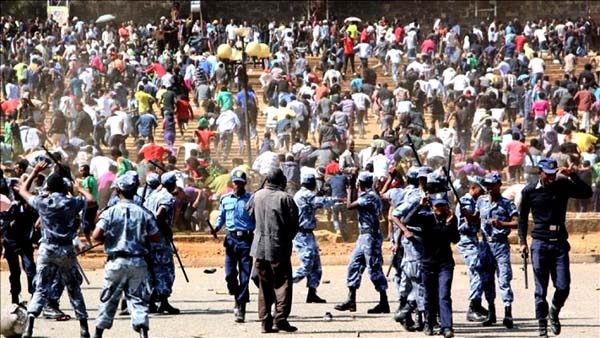
At least 52 people have been killed in Ethiopia after the death of a popular singer sparked huge protests in the Oromia region, a local official has told the BBC.
Thousands of fans had gathered to mourn Hachalu Hundessa, who was shot dead on Monday night while driving.
Police say 35 people, including prominent politician Jawar Mohammed, have been arrested.
The motive for Hachalu’s killing remains unclear.
But police say they have arrested two people in connection with the killing.
Hachalu, 34, had recently said that he had received death threats. He will be buried on Thursday.
His songs focused on the rights of the country’s Oromo ethnic group and became anthems in a wave of protests that led to the downfall of the previous prime minister in 2018.
Many people were injured in Tuesday’s protests and there was “significant destruction to property,” Getachew Balcha, the spokesperson for the Oromia regional government, told the BBC.
The authorities shut down the internet on Tuesday in parts of the country as the protests against his killing spread across the state. The service remains unavailable.
Trouble started when Hachalu’s body was being transported to his native town of Ambo, west of the capital, Addis Ababa, for burial, but Mr Jawar and his supporters intercepted it and tried to return it to the capital.
Federal Police commissioner, Endeshaw Tassew, said on Tuesday that a stand-off ensued.
“There was a disturbance between federal security forces and others, and in the process one member of the Oromia special police force was killed,” Mr Endeshaw said.
“Thirty-five people including Jawar Mohammed have been put under arrest. The security forces have taken eight Kalashnikovs, five pistols and nine radio transmitters from Jawar Mohammed’s car,” he added.
Tiruneh Gemta, an official from Mr Jawar’s Oromo Federalist Congress party, told the BBC Afaan Oromoo service they were “concerned” about his arrest and that they haven’t visited “those who who arrested due to the security situation”.
Mr Jawar, a media mogul, has led calls for more rights of the Oromo, Ethiopia’s largest ethnic group, who have been politically marginalised by previous governments.
He supported reformist Prime Minister Abiy Ahmed, himself an Oromo, but has since become an ardent critic.
Hachalu was more than just a singer and entertainer.
He was a symbol for the Oromo people who spoke up about the political and economic marginalisation that they had suffered under consecutive Ethiopian regimes.
In one of his most famous songs, he sang: “Do not wait for help to come from outside, a dream that doesn’t come true. Rise, make your horse ready and fight, you are the one close to the palace.”
The musician had also been imprisoned for five years when he was 17 for taking part in protests.
Many like him fled into exile fearing persecution but he remained in the country and encouraged the youth to struggle.
In Adama, 90km (56 miles) south-east of Addis Ababa, five people died on Tuesday after being shot during demonstrations and 75 others were injured, hospital chief executive Dr Mekonnin Feyisa told BBC Afaan Aromo.
In the eastern town of Chiro, two people were shot dead during protests, a medic at the local hospital told the BBC.
In the eastern city of Harar, protesters pulled down a statue of a royal prince – Ras Makonnen Wolde Mikael – who was the father of Haile Selassie, Ethiopia’s last emperor.

